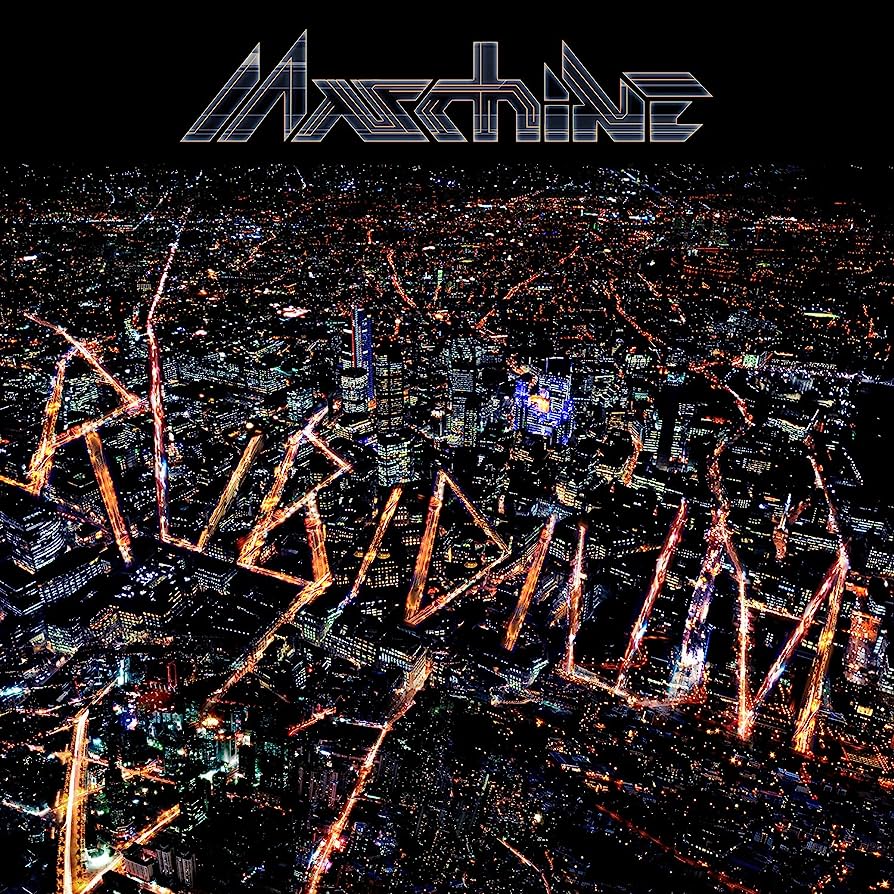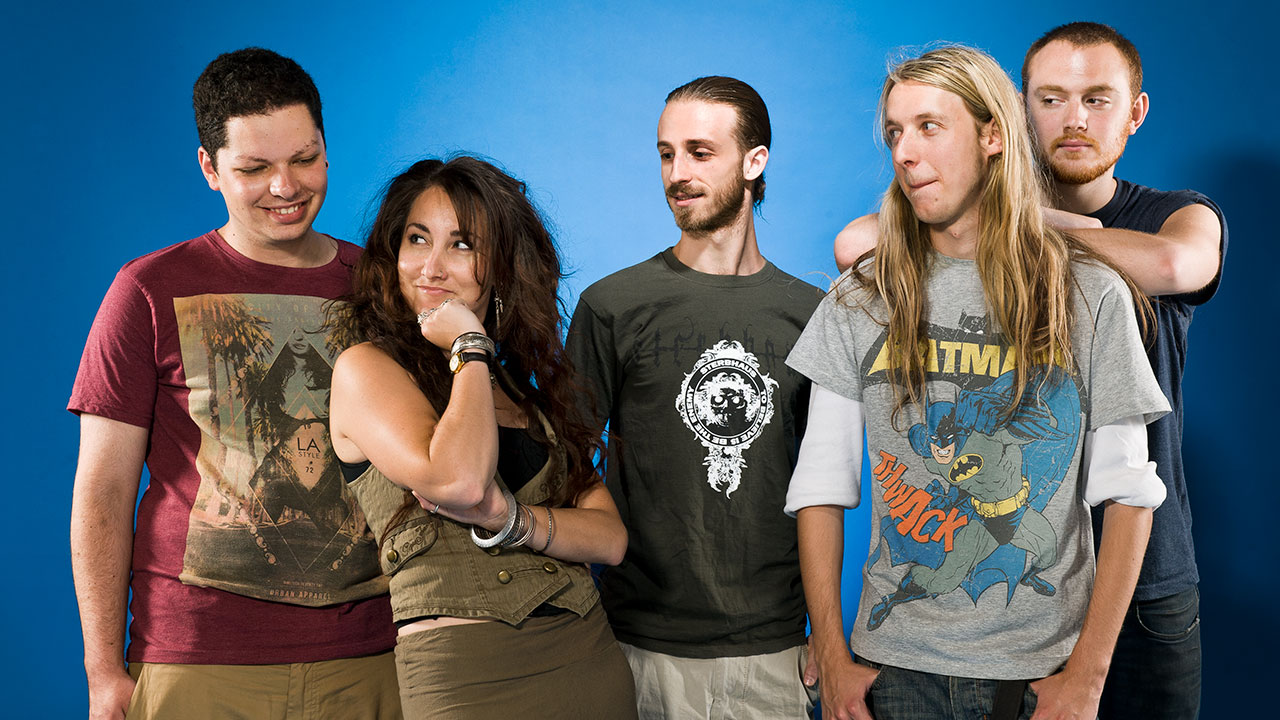It all started with the audacity of youth. Heading south from the Cheshire plain to study for a music degree at the acclaimed Brighton Institute Of Modern Music, Luke Machin had one aim – to start a progressive metal band. With that Institute on track to becoming the British equivalent of Boston’s renowned Berklee College, you might envisage that with a myriad of technically gifted musicians crammed into the city, locating those of a similar mind would be less than arduous. Yet with the college also regularly churning out pop acts, Machin explains that it took years to finally locate and settle on a fixed line-up.
“It was a really hard thing to do,” he laughs. “I started off with this other bass player, who I used to live with, and he was into Porcupine Tree and Opeth and all that kind of stuff. So we kind of started it, along with our original drummer, Doug Hamer, and we went out playing as a three-piece. I then got into the house band and started playing around with a lot of different musicians. I was really trying to find suitable musicians who were also into this style of music. I think we must have gone through about five different guitarists with completely different styles. Some guys played classical and blues and that kind of thing, which didn’t really work out. Eventually we found someone who was into this kind of music.”
Around the same time, Machin and bassist Daniel Mash became members of The Tangent, alongside that band’s leader Andy Tillison. Joining in late 2011, they were involved in the recording of the COMM album and would also join Tillison on tour. In an interview at that time, Tillison described Machin as an “unbelievable musician”, adding that he’d decided to “leave him the band when I’m finished or get knocked off my motorbike”. Yet in 2012, Tillison decided to move on without Machin and Mash, citing financial issues and the practical inability to pay them top wages.

“Yes, the split was from Andy’s side and it was due to financial issues,” says Machin. “I mean, from our side, we were doing it for the music, but going around Europe on a shoestring budget isn’t the best idea, with four guys in a truck. I guess it just isn’t great when you work hard and come home with a few beans in your pocket. But it was good fun and it was an absolutely amazing experience and a fantastic platform that he gave me. I’ve only got positive things to say about Andy as he’s such a great songwriter and brilliant keyboard player. It was just a shame that we had to dissolve the band in the end. It gave me some great exposure though, and we played from Moscow to Quebec City.”
Tillison was, however, involved in getting Maschine signed to the InsideOut label, after the record company had asked him to try to locate a young, English prog band. After watching a Maschine performance – as well as having a working knowledge of their attributes – he recommended the act and they were soon signed. The band originally performed under the moniker of Concrete Lake, a name that was directly inspired by the 1998 Pain Of Salvation album One Hour By The Concrete Lake. With Machin being an ardent admirer of the Swedish prog-metal band, it was perhaps understandable, but as he admits now, it’s a decision he regrets.
“I really didn’t know where the band was going until InsideOut heard of us,” he says. “Obviously Pain Of Salvation are on the same label which was a bit of an issue at first, but they said that as long as we changed the name, they’d be happy. It was in the very early stages of the band so it wasn’t a problem and we were able to change it. Originally, when we played as Concrete Lake, people were coming to the shows just because of the name. So we had that tag attached to it where people would naturally assume that we sounded like Pain Of Salvation. But as soon as we became Maschine we lost that, which was a good thing really.”
Ironically, Machin was asked to audition for Pain Of Salvation around the same time, and although he impressed the Swedes, he reveals that it was his determination to push Maschine – as well as obvious geographical issues – that ensured he didn’t get the role.
“I flew to Stockholm and went on to where they live. It was surreal doing an audition as I’m such a huge fan. I explained to them that I had my own band and I also knew that we had just been signed to InsideOut, so I put that across. Obviously, as I didn’t know where my own band was going, I couldn’t commit 100 per cent to it and they wanted someone who lived nearby so they could rehearse. So that didn’t really work out. But they did ring me up in 2012 and asked me to do a live guest spot with them in London, which as you can imagine was incredible.”

Musically, Maschine are an original bunch. Inspired by a wide range of prog acts, they are at times intriguingly adventurous, never afraid to enhance tracks with the unexpected. There are moments of metal and lighter traditional prog, with snippets of pop and jazz infiltrating the sound. Indeed, much as listeners have at times struggled to pigeonhole them, Machin too admits that he finds the music hard to readily categorise.
“People describe different prog bands to me but I really didn’t know the modern ones until recently,” says the guitarist. “I hardly knew any of them and I hadn’t heard of bands like Arena before I joined The Tangent. Obviously now I’m a bit more clued up, but for me, I’ve always been influenced by It Bites, John Coltrane, Chick Corea, as well as Mahavishnu Orchestra and a lot of the fusion stuff.
“I’m the sole writer in the band but I get inspired by whatever the rest of the band are influenced by. So Dan on bass brings a funk edge to it, and we can work out funk parts. The previous drummer was into metal, so he brought the harsh dynamics into it. There are also influences such as Genesis, which are the lighter end. So it’s really a mixed bag of stuff and it’s nice not to have to categorise what I’m doing.”
There are of course dangers to such musical virtuosity and flair. Bands can fall victim to their own combined talents, making music that merely pleases their own personal, technical challenges rather than the listener. It’s something that Maschine have thus far managed to avoid, but is Machin aware of the pitfalls of incorporating thousand-notes-a‑minute histrionics into music?
“Oh absolutely, but melody is absolutely key to what I do,” he argues. “I’ve heard loads of bands out there who try and do the Dream Theater thing. It can sound a lot like Dream Theater but it is nowhere near as good. We would rather have our own sound. I’ve never really been into all that sort of stuff and I just love simple melodies. Even music like Zoom by Fat Larry’s Band, that has a really nice melody. So it’s good to have that mixed with the technical stuff as well. It’s making it so that the audience can still understand it, so it’s getting that balance. It’s good to have the audience nodding in appreciation and we’re wary of not hitting them with something complex straight away.
“We’ve played Summer’s End before and if we were to go out there and play hugely technical stuff, it would just go over people’s heads. So we tried to do more of a traditional prog-rock thing but with a modern edge.”
Certainly, the band have attained a live following who are already dazzled by the sheer variety of their material and the consummate way that they pull it off on stage. Having said that, Machin fondly recalls a time when the band performed early sets to rather bemused – yet ultimately appreciative – audiences.
“Well, we did a few shows in Brighton just to start off with. There are a lot of musos down here and students and I don’t honestly think they knew what style our music was,” he chuckles. “I mean, when we were playing they really enjoyed it and then afterwards were saying things like, ‘Oh my God, that’s fantastic. What kind of music is it?’ So we’d tell them it was progressive rock and they’d be like, ‘Oh right, I must go and check that out.’ It was quite funny. But yes, it’s really hard to describe our sound to someone who is a bit younger than us, or not into prog rock. I usually say that we’re a modern-day Pink Floyd or Genesis.”
The band intend to get on the road to support their new album, and are also hoping to land some support slots to help spread their music, ideally to a younger audience. As ambitious as their groundbreaking music, Machin is also determined to follow the likes of Steven Wilson in order to carve an idiosyncratic niche for his music.
“For us, it’s just really climbing the ladder, step by step,” he explains. “We just want to get out there with this album, playing as many live shows as we can. We want to try and make our music accessible to the younger generation as well as the prog fans out there, so we can fuse the two together.
“I think we can record something that gives the younger generation an access into this kind of music and get it back on the map again.
“Personally, I’d love to get to where Steven Wilson’s at. Touring the world, doing his own compositions, having an amazing band and stage show. That would be good…”
This article originally appeared in issue 38 of Prog Magazine.
